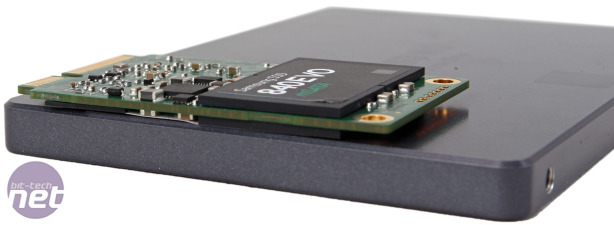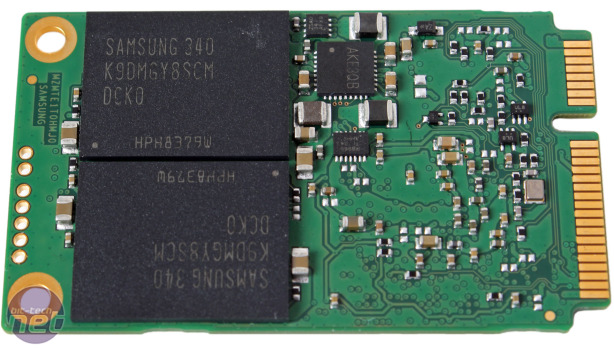
Performance Analysis
The first thing of note is that across the board performance of the EVO mSATA is essentially identical to the 2.5-inch drive, which is a fantastic result given how much smaller the former is. It also suggests that RAPID mode will perform in much the same way, although we've yet to have the chance to test with it enabled.Sequential performance is excellent. It tops out in read speeds at around 540MB/sec in CrystalDiskMark (CDM). This isn't enough to differentiate it from Toshiba's 256GB mSATA drive, but over the other tested drives it has a clearer advantage. This advantage increases quite dramatically when looking at write speeds, where the EVO mSATA also outperforms the Toshiba model. Samsung's drive is the only one to hit speeds here over 500MB/sec, with a result that's almost double that of the Crucial M500 mSATA SSD. TurboWrite is evidently still very effective, and the 12GB buffer should be more than enough for most tasks (even the smallest 3GB buffer of the lower capacity drives should still be adequate for most tasks).
Whereas Toshiba's THNSNH256GMCT struggles with single queue-depth (QD) 4K reads, Samsung's SSD 840 EVO mSATA maintains pole position. It has an obvious lead over the other drives here, and is the only one to manage over 40MB/sec, with the closest competitor (Plextor) only about three quarters as fast in both AS SSD and CDM. Moving to write speeds, Crucial actually moves into first place, but the SSD 840 EVO mSATA is very close to it and easily ahead of the remaining two mSATA SSDs.
At higher queue depths, Samsung is again top of the charts in both read and write speeds. The Toshiba drive comes close when it comes to read speeds but is again underwhelming with its write speeds. Meanwhile, the small victory we saw Crucial achieve at a single queue-depth slips away, as its less powerful controller can't cope as well with the increased performance strain.
In PCMark 7's Starting Applications test, we actually see Toshiba's drive perform very well, with an 11 percent lead over Samsung's, suggesting that the former's controller and/or firmware is more suited to such workloads. That said, the result for the SSD 840 EVO mSATA is far from bad, and there's a large distance between it and Crucial's drive. It also catches up to the Toshiba THNSNH256GMCT in the Gaming test, where the two are as fast as each other.
Conclusion
We said before that there was little to dislike about the SSD 840 EVO range, and with Samsung seemingly having changed nothing except having made it smaller and lower power in the move to mSATA, that's still very much the case. The 1TB model is probably too expensive for most, but that's sadly just a fact of life when it comes to buying that much NAND. The lack of extra pricing for it over the usual 2.5-inch model is excellent news, however, and means it can still be seen as good value, at least relatively. Hopefully pricing at retailers will very much be in line with the regular drives.First and foremost then, this drive is a fantastic option for users limited to one mSATA expansion slot, such as in certain portable systems or Intel's NUC, as it offers an excellent compromise between capacity, physical size and performance. It could also gain a fan base in small form factor desktop circles, as motherboards are available with built in mSATA bays. With Samsung having maintained performance from the original 840 EVO in this drive, it's a fairly sure bet that it's done so at lower capacities too, so you should also be well covered if the mighty 1TB model is out of your league.


MSI MPG Velox 100R Chassis Review
October 14 2021 | 15:04










Want to comment? Please log in.